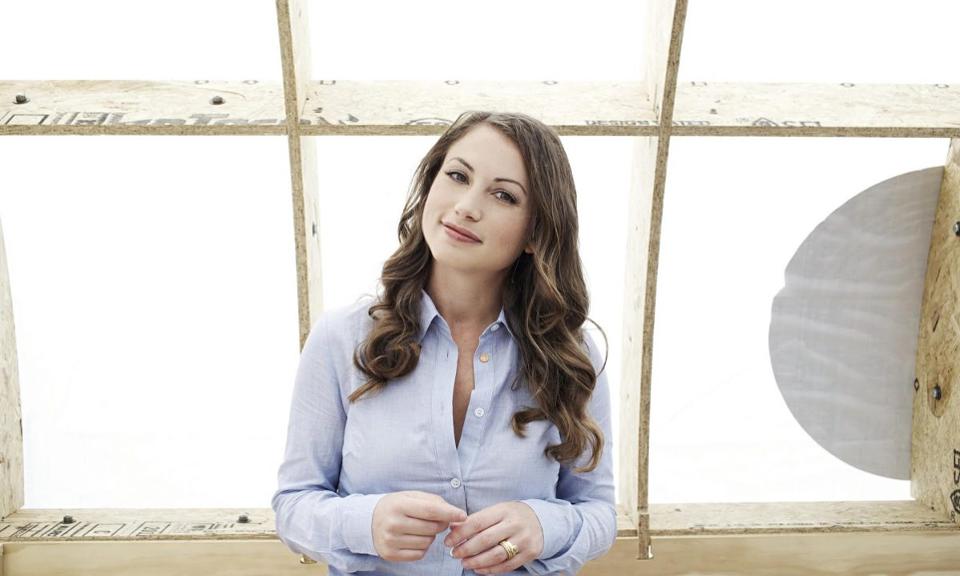Debbie Sterling, the founder of GoldieBlox, has made it her mission to inspire girls to love science, technology, engineering and mathematics (STEM) to contribute to closing the gender gap in STEM fields.
GoldieBlox is an award-winning children’s multimedia company that creates toys, books, apps, videos and other products to “empower girls to build their confidence, dreams and ultimately, their futures.” If you recognize GoldieBlox it might be because you’ve seen it in toy stores, the app store, their Super Bowl commercial or their float in the Macy’s Thanksgiving Day Parade. GoldieBlox has received accolades including being named one of Fast Company’s Most Innovative Companies and The Toy Industry Association’s Toy of the Year. Sterling has been inducted by Former President Obama as a Presidential Ambassador for Global Entrepreneurship and honored by the National Retail Foundation as one of 25 People Shaping Retail’s Future and with the National Women’s History Museum’s Living Legacy Award for her work inspiring girls.
It’s clear GoldieBlox has made an impact. It has had more than 1 million app downloads and more than 1 million toys sold across more than 6,000 major retailers worldwide. Sterling and her team have recently partnered with Girl Scouts to create badges for accomplishments in STEM fields. Sterling has turned her own love of STEM into a fun and educational way to inspire the next generation.

What inspired you to start GoldieBlox? What was your career path?
I graduated from Stanford in 2005 with a degree in engineering and product design. On my graduation day, I was incredibly fortunate to be in the audience during Steve Jobs’ famous commencement speech, which brought tears to my eyes. He told us all to never settle until we found our passion.
From that day forward, I set out to find my passion. The problem was, I had no idea where to start! I had chosen engineering as a major because I was really inspired by the idea of designing products that could help people and make the world a better place. I had a couple of job offers from Facebook and Google, but I ended up moving to Seattle (admittedly, for a guy!) and taking the only job I could find as an intern at a branding and design agency called Hornall Anderson.
At the time, I wasn’t making much more than minimum wage, but I was determined to prove myself. My engineering skills weren’t really relevant at this new job, but what did come in handy was my training in design thinking and ethnographic research. Plus, I was committed to working hard and learning on the job.
I read every book I could get my hands on about branding, design, and marketing. I was always the last person at the office every night, putting in the extra effort on every project that came my way. In just a few short months, I proved my worth and got offered a full-time job. Just three years later, I was the lead brand strategist on exciting projects like re-branding the New York Knicks and re-designing the global packaging of Pedigree dog food.
Even though I loved working at a creative agency and I loved my co-workers, I started to feel a sense of emptiness. I wanted to be contributing to the world in a more meaningful way, to give back and make a difference. I started researching volunteer programs like the Peace Corps. and came across an organization called VSO. I filled out an online application, thinking I probably would never hear back, or if I did, it would take months.
Only a handful of days later, I found out I had made it past the first round, and I had an in-person interview in Vancouver the next week! Before I knew it, I was matched with a six-month volunteer placement in rural India. I quit my job, loaded up on vaccinations, moved out of my apartment, and traveled alone for the first time in my life. I was excited to make a 180-degree change in my life and I felt like this was the shake-up I needed to truly discover my passion.
Volunteering in India was a life-changing experience in so many ways. To this day, I still reflect on all the things I learned and how it fundamentally changed me as a person. However, once I returned home, I was even more confused about what I should be doing than when I’d left!
From my experience in India, I realized I didn’t really want to work in a non-profit, so I started soul searching for something new. I came across a job opening on LinkedIn for a marketing director of a small, woman-owned jewelry company called Lori Bonn. One of my favorite activities in college was jewelry making and I thought to myself, “Maybe jewelry is my passion,” so I applied and I got the job.
Over the next three years, I learned all about how to run a small business. Even though I was in my mid-twenties, I had a very senior role at the company, enabling me to learn all the ins and outs. I like to say that working at Lori Bonn was like getting paid to go to business school. I learned what a profit and loss statement is, how to get things manufactured overseas, how to set up a tradeshow booth, how to meet with major department store buyers, and the list goes on and on. Even though I was learning a ton at Lori Bonn, I knew deep down that it wasn’t my true passion. Then one day, I found it.
I had started a club with my friends called “Idea Brunch,” where once a month, we’d get together, cook a big breakfast and each person would get up in front of the group and share their latest idea. My friend, Christy, who had studied engineering with me in college, got up and started complaining about the lack of women in our classes. She mentioned how she used to play with her brother’s construction toys when she was young and how that inspired her early interest in engineering. Her idea at “Idea Brunch” was engineering toys for girls. It was then that I finally had my “Eureka!” moment because I knew instantly that it was my true passion… what I had been searching for ever since Steve Jobs’ speech.
And somehow all of the disparate lessons from my circuitous career path – from branding to volunteering to jewelry marketing – were so incredibly helpful in preparing me with the skills and confidence I needed to go from that initial idea to actually building a business. It’s now been six years since I quit my job to start GoldieBlox, and I still wake up every day incredibly passionate about getting girls interested in engineering and technology.
What has been the biggest challenge and, on the flip side, the biggest reward of starting GoldieBlox?
I faced my fair share of challenges when I first started out. I saved up as much as I could to eventually quit my job and go full-time on starting the company. I really believed in my concept – STEM toys for girls – but the toy industry wasn’t as receptive. I kept hearing from industry veterans that my idea was a good cause, but it would never sell. I knew that if I wanted to make GoldieBlox successful, it meant I had to break down the outdated gender stereotypes that plague the industry. To this day, these outdated stereotypes continue to be my biggest challenge.
When I launched GoldieBlox on Kickstarter, the campaign went viral overnight and I ended up exceeding my fundraising goal. It was clear that there was an appetite for GoldieBlox products and our greater social mission. Now I hear from parents and young kids from all over the world about how happy they are to have GoldieBlox and how fun STEM is. It’s really rewarding when I receive a letter from a kid that says they want to be an engineer when they grow up. I save every letter, every video, every drawing. They literally mean the world to me and they keep me going, even when times get tough.
What advice do you have for other women who hope to start their own businesses?
First and foremost, make sure that your business idea is something you are truly passionate about. You need to be obsessed. Because if it is something you’re even slightly unsure of or lukewarm about, you won’t have the inner fire and conviction you will need to overcome the inevitable rough patches and rejections you will face.
Once you have found a business idea that is your true passion, you need to share that passion with everyone you possibly can. Whether it’s someone you’re sitting next to on an airplane, a waiter at a restaurant, a Lyft driver it doesn’t matter. Share your passion with the world, because as soon as you do, people will start coming out of the woodwork to help you. That waiter might have a daughter looking for an internship. That Lyft driver might be the nephew of your ideal business mentor. These types of things really happen once you put yourself out there!
What is a workday as Debbie like? Please walk me through a day!
I know people always say this, but there’s truly no typical workday for me. It’s true for all entrepreneurs! One day I may be on a 6 am flight to Los Angeles or New York for a business trip and in back to back meetings. Another day I may be in our Oakland office proofing design concepts, leading a company-wide brainstorm, interviewing potential new hires, or meeting with new partners. It always changes and I love that no two days are alike.
What are your responsibilities as founder and CEO of GoldieBlox?
I’m responsible for the overall vision of the company, and for finding the best employees, investors, and partners in the world to help us achieve that vision. Over the last year, we have been evolving beyond toys to become a children’s multimedia brand. In the last year alone, we’ve launched multiple YouTube series, released our first chapter book series with Random House Children’s Books, and created STEM engineering badges for the Girl Scouts. We’re much more than a toy company and I’m constantly looking for new ways to share GoldieBlox and STEM with kids. Last but not least, I make sure that GoldieBlox always remains true to its social mission of empowering girls by making STEM fun.
What are the most important characteristics someone needs to have to be successful in your role?
Grit. Charm. Passion. Decisiveness. Intuition. Creativity. Risk tolerance.
What are three characteristics you look for when you’re hiring a new team member?
I always look for people who are genuinely passionate about our social mission. They need to have the skills to be able to do the job, or at least demonstrate they are quick learners. I look for people who are self-starters that thrive in uncertainty. In entrepreneurial environments, it’s critical to be able to solve problems on your own. I also look for people who seem like they love to learn and don’t act like they already know everything. Last but not least, I constantly look for diversity and make sure we have a pool of very diverse candidates for every role.
What are the most important skills for doing your job and how did you develop them?
One of the most important skills of a CEO is being an effective communicator – with employees, investors, partners, and the media. You need to be able to clearly communicate your vision, feedback, challenges, opportunities, and expectations. It’s hard to know how to communicate when things aren’t going well. And believe it or not, sometimes it’s even harder to communicate when things are going well. How do you properly celebrate your company successes with your team? How do you keep your team focused and keep priorities in order when there are so many exciting opportunities in front of you? Early on, I started working with an executive coach on a monthly basis. We’ve now been working together for four years and he has really helped transform me into the leader I am today.
What’s the biggest lesson you learned at work and how did you learn it?
Don’t be afraid to ask for help. It’s impossible to know everything, but there sometimes feels like there’s pressure to pretend like you know it all.
I actually first learned this when I was in college. I was taking some really challenging engineering classes and I didn’t follow along. Rather than ask for help, I just didn’t say anything and pretended I understood the material. I would have been much better off raising my hand, asking questions, and going to office hours, but I was too ashamed to admit I didn’t get it.
At GoldieBlox, I’ve found much more success as a leader when I’m vulnerable and honest with my team about what I know and don’t know. Rather than play-acting like the overly confident white male CEO stereotype of what a leader is supposed to be, I have achieved far more success when I’m just comfortable being honest and being myself.
Congratulations on the new Girl Scouts badges for accomplishments in STEM fields. Please tell me more about the initiative!
Thank you! It’s something I’ve dreamed about for years at GoldieBlox, and now we are releasing new engineering badges for Daisies and Brownies. The goal is to get girls inventing and learning what it means to be an engineer. By earning these badges, we are removing the intimidation factor and building girls’ confidence with STEM!
I was a Girl Scout when I was young, so these new badges have been a really proud moment for me and something that will have such a positive impact on millions of girls.
All of these kits are designed to teach Girl Scouts something new and make engineering fun. Not only do the activities teach engineering principles that are applicable in the real world, but they are a ton of fun for the girls as well as the troop leaders, who are often intimated by STEM themselves. By earning these badges, we are removing the intimidation factor and building girls’ confidence with STEM!
How do you think we can encourage more women to join STEM fields?
It starts with parents and teachers encouraging kids and getting them involved in STEM at a young age. If we teach girls early on that they’re capable and build their confidence, they won’t feel as intimidated by entering these male-dominated fields.
It’s also important for kids to learn about women in STEM to have role models that will inspire them. We often hear about male scientists and engineers, but we rarely learn and celebrate stories about women. That’s why “Hidden Figures” was so important. We finally got to hear about women who changed the world through science and give them the credit they deserved.
What is one thing that you wish you had known when you were starting out your career?
Stop being so afraid to talk about money! Practice with your colleagues. Get advice from friends. Do the research. Understand your value and what you’re worth, keep track of your successes at work and, if you feel like you should be earning more, build your case to your boss of why that is, and ask for it! The worst thing that can happen is they say no. And in that case, ask them what you can be doing to get to where you want to be. Follow the advice and in your next review, ask again!
What is the best advice you’ve ever received?
Create your own luck. Rather than sitting around, waiting for your lucky break, put yourself out there, and make it happen. For example, if there’s someone who you really think would be a great mentor for you, start figuring out a way to meet him or her. Do you have any mutual connections on LinkedIn? Are they doing a talk or event near you anytime soon? I guarantee if you ask enough people, do enough homework and try hard enough, you will get that meeting eventually. And it can turn into your big break.
What is your business advice for other young professional women?
If you’re thinking about starting your own company, you need to give it a real chance. If it’s an idea you believe in, you need to give it your full-time attention. It may seem daunting, but save as much money as you possibly can so you have enough cash in the bank to last for at least a year. What’s the worst that can happen? At the end of the year, you can always look for another job. Best case scenario, you discover you’re really onto something, you convince others of this as well, and before you know it, you’ve written yourself your first paycheck.































